AZERBAIJAN DEMOCRATIC REPUBLIC — THE FIRST PARLIAMENTARY REPUBLIC IN THE EAST
(May, 1918-April, 1920)
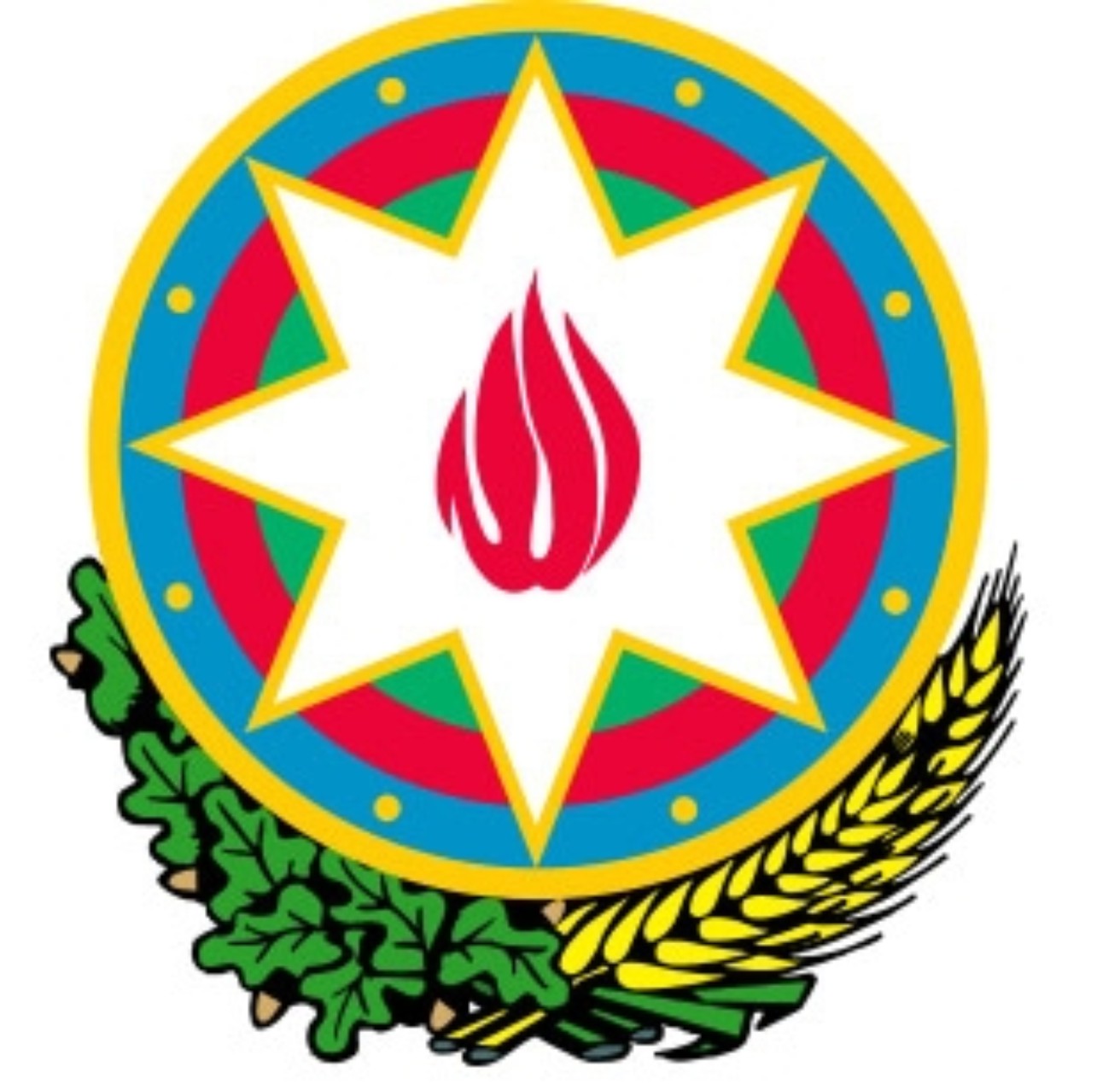
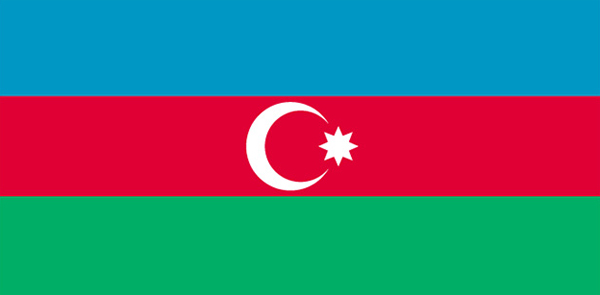
The cruelest and bloody regime in the entire history of civilization, Tsarist Russia, did not manage to destroy the traditions of the state system establishment of the Azeri people. The Russian Empire that enslaved Turkic-Muslim peoples and tried to destroy their national consciousness and ancient traditions of the state system establishment turned this policy into horrific bloodshed in the South Caucasus. This cruel policy involved ethnic cleansing of Turkic-Muslims of the South Caucasus in Azerbaijan, in order to gain access to the warm seas after destroying Iran and Turkey, thus reaching the most important target in Russian history - India. For this very purpose, Christian people of different origins were brought to Azerbaijan from various regions of the empire, in which the local population was then converted to Christianity and russified. Armenian-Muslim fighting was the most terrible of events of all those committed to the successful implementation of the aforementioned brutal policy. In other words, Azerbaijan became the site of the most terrible ordeal under the policy of Tsarist Russia nationalism.
Therefore, Azerbaijan, which has the most ancient traditions of the state system established in all of the former Russian Empire became the major center of the resistance movement against the cruel colonial regime of tsarism. The Azeri people, which were accustomed to ruling rather than being ruled, led the movement of national freedom of all Turkish-Muslim peoples of Russia under the command of the leading intellectuals of the country.
The late 19th-early 20th century was the period of the establishment of
new relations that influenced all spheres of life of the Azerbaijani
people. Social processes of that period turned the large industrial city of
Baku into the economic center of the entire Caucasus region.
Heydar Aliyev
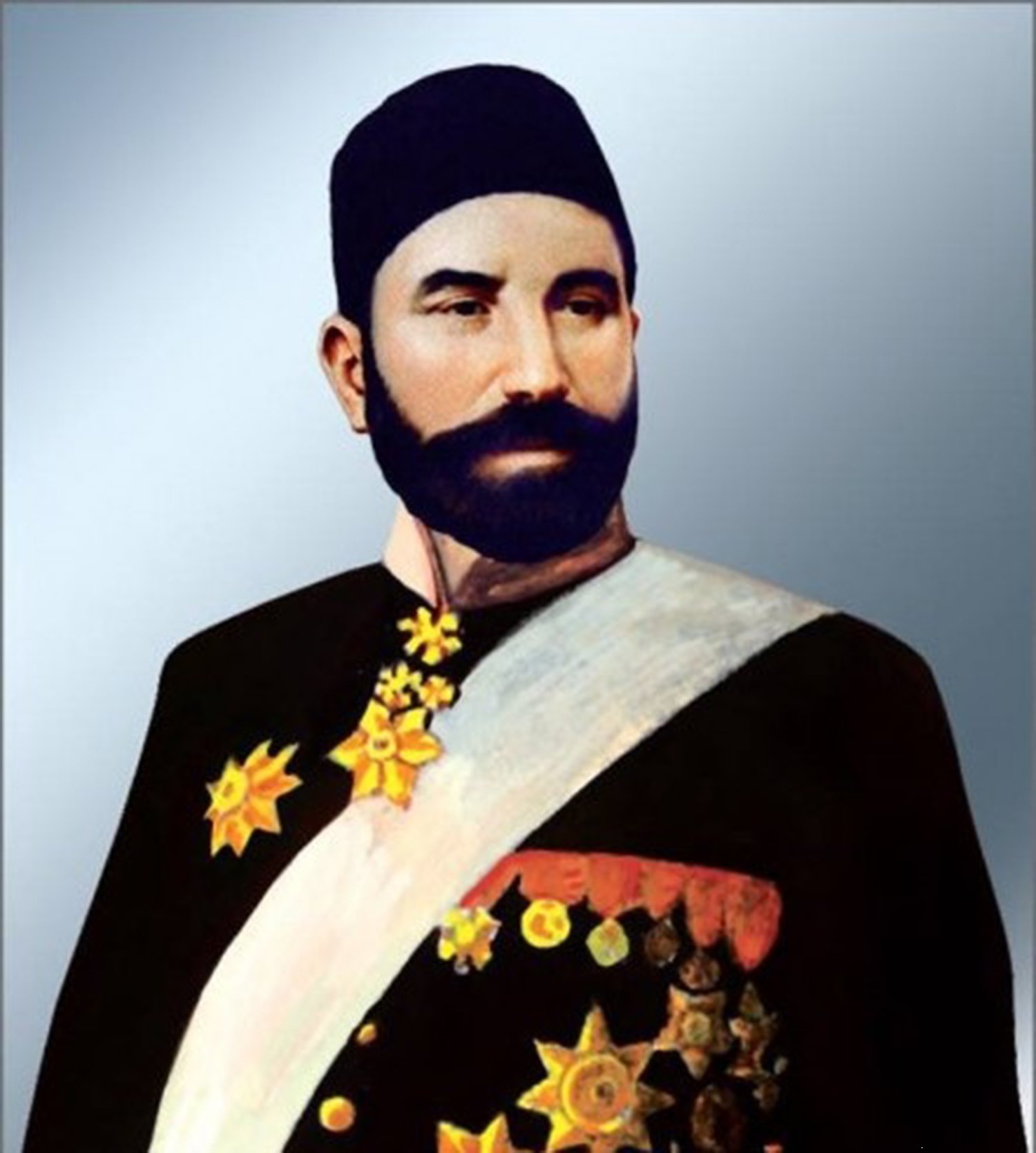 In the early 20th century, the Russian Empire initiated reforms in order to escape from the deep military, political and economic crises. At the same time, Azeri intellectuals protected by the great philanthropist H.Z.Taghiyev along with other requirements demanded the representation of the Turkic-Muslim population in the central government bodies, their participation in local executive and judicial bodies, and struggled for the prevention of discrimination and restrictions.
In the early 20th century, the Russian Empire initiated reforms in order to escape from the deep military, political and economic crises. At the same time, Azeri intellectuals protected by the great philanthropist H.Z.Taghiyev along with other requirements demanded the representation of the Turkic-Muslim population in the central government bodies, their participation in local executive and judicial bodies, and struggled for the prevention of discrimination and restrictions.
The Prominent lawyers Alimerdan bey Topchubashev, Shemsi Asadullayev, Ahmed bey Aghayev, Adil khan Ziyadkhanov, Ali bey Huseynzade and a number of other intellectuals of Azerbaijan were the leaders of this movement.
North Azerbaijan became the symbol of the struggle of all eastern people for freedom and the downfall of Tsarism. An idea to establish a political organization for uniting all Turkic-Muslim people of the Russian Empire in the struggle against Tsarism was generated in Azerbaijan in no way by accident.
The representative from Azerbaijan, Alimerdan bey Topchubashov conducted a report devoted to the situation and problems of Turks within the Russian Empire at the session that the world's Muslims held in Nijni-Novgorod in 1905. The intellectuals of Azerbaijan took an active part in the development of the Program and Statute of the Union of All-Russian Muslims (Ittifagi-Muslimin).
As a result of a tense struggle conducted in complicated and difficult conditions, the well-known representatives of Azerbaijan Alimerdan bey Topchubashev, Ismayil khan Ziyadkhanov, Abdurrehim bey Hagverdiyev, Mamed Taghy Aliyev, and Asadullah bey Muradkhanov were elected the deputies of the First State Duma of the first Russian parliament. Two of these highly educated people were lawyers by profession: Alimerdan bey Topchubashov graduated from the University of Petersburg and Ismayil khan Ziyadkhanov was educated at Moscow University.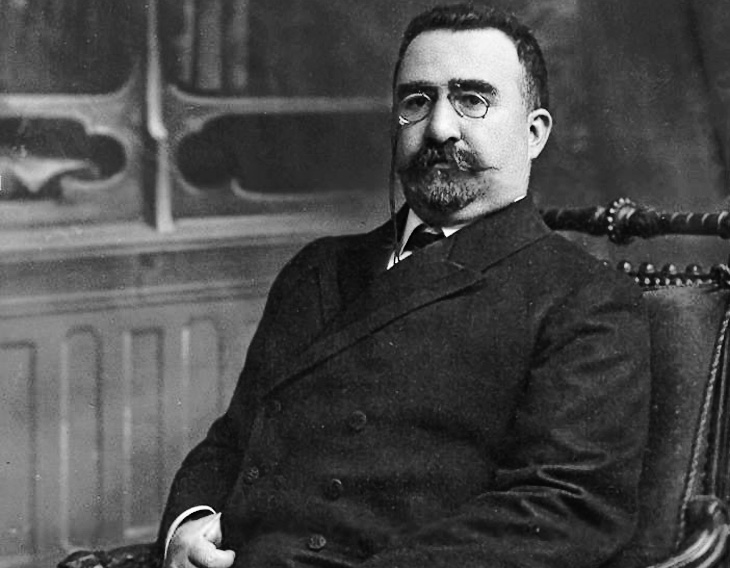
Alimerdan bey Topchubashev was elected the chair of the largest faction of the State Duma of Russia — the Muslim faction. The deputies of Azerbaijan speaking in Duma, criticized the policy of national bloodshed held by the Russian Empire in the South Caucasus, discrimination of Azeri and Muslim people, the policy of resettlement, enslaving of the people and defended the interests of not only Azeri people, but all Muslims of the Russian empire.
Thus, the Azeri deputy Ismayil khan Ziyadkhanov pointed out decisively in one of his speeches at the Duma session: "We (Azerbaijan) were occupied a century ago and we were deprived of every right. We were enslaved and our national wealth was stolen. We were prohibited to enter high school. Not one Turk was among the officials of the state bodies. We suffered from deprivation of land. However, on top of all this, peasants were moved to our land from Russia. You will establish settlements planned for Russian peasants on these lands that are stained with blood on the basis of the national bloodshed. This is nothing but the way of ruling based on the principle "split up and rule". We have been walking on dead bodies in our motherland suffocating with blood for two years. Our patience has been exhausted". The deputies of the Second State Duma Fatali Khan Khoyski, Khalil bek Khasmamedov, Mustafa Makhmudov, Mamed agha Shikhlinsky, and Zeunal Zeynalov also opposed tsarism in every way, including the policy of national and religious discrimination.
The Deputies of Azerbaijan made a great contribution to the struggle of all Turkic-Muslims against tsarism, thus creating much apprehension regarding tsarism, and along with other factors in the dismissal of the first and second Dumas. Therefore, Central Asia, Siberia, and other regions, mainly inhabited by Turk-Muslims, were not allowed to take part in the elections of the third Duma, and Baku city was deprived of the right to nominate its own candidate.
For this reason, the Muslim population of the entire South Caucasus was represented only by one deputy Khalil bey Khasmamedov in the State Duma. The fourth state Duma also included only one representative of the South Caucasus Muslims — Mamed Yusif Djafarov.
Almost all Azeri deputies elected to the State Duma were the ardent leaders of the national movement. The Duma Deputies Alimerdan bey Topchubashev, Ismayil khan Ziyadkhanov, Fatali khan Khoyski, Khalil bek Khasmamedov, and Mamed Yusif Djafarov were lawyers. Mamed agha Shakhtakhtinski was a student at the University of Sarbon and graduated from the faculty of philosophy of the Leipzig University.
Thus, in conditions of the collapse of the peoples' prison Russian Empire during the Great Patriotic War Azeri people were prepared for the life of the independent state due to the mastering of the most up-date culture of governing and ancient traditions of state system establishment.
Unlike the southern regions, which preserved the part of the Iranian kingdom and ruled by the Gadjar Dynasty, North Azerbaijan was able to familiarize with the new traditions of democratic state organization and parliamentary system of the West through Russia and of Russia during its reign over Azerbaijan.
The intelligentsia of Azerbaijan, including Alimerdan bey Topchubashev and professional lawyers, acquired large experience in the rich parliamentary system of the State Duma of Russia. They were ready to create the most democratic republic ensured of all rights and liberties and completely differing from the absolute monarchy of Russia, leading to the cruel national tyranny which they despised. The concept of creating a democratic state was formed by the officials of the Azerbaijan People's Republic in the time of their operating in the Russian State Duma. Therefore, the formation of the People's Republic of Azerbaijan as a parliamentary state was caused by the historical reality. Following the overthrow of tsarism, the real development of events also led to this process.
The complicated sociopolitical processes developing in the 20th century led to
profound changes in the society of Azerbaijan, our prominent state officials
formed in new conditions were ready to react properly to the challenges
and requirements of the century. A sound foundation had been created for the
establishment of the People's Republic of Azerbaijan.
Heydar Aliyev
The Romanovs dynasty was overthrown in Russia in February of 1917. The Temporary government which came to power created a Special Committee for the South Caucasus after the overthrow.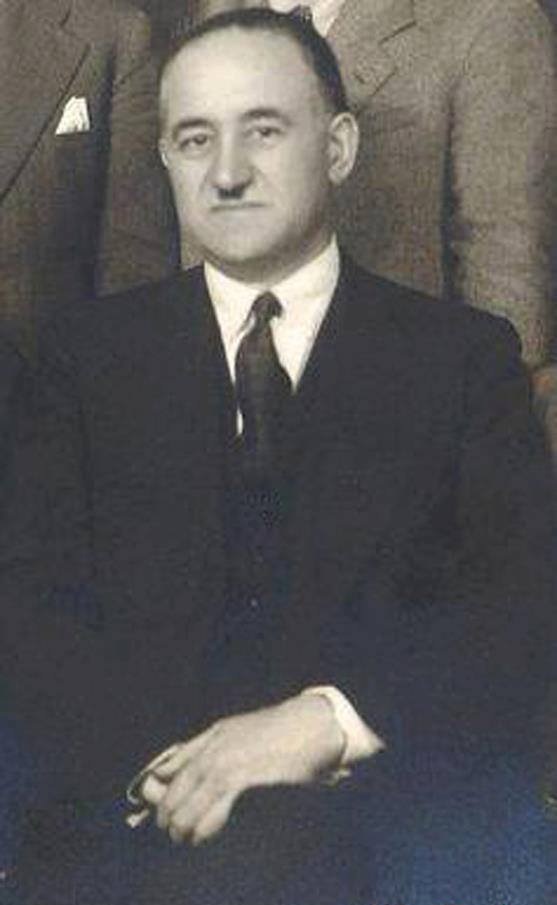 However, the government could not rule long. The South Caucasus Deputies elected to the Assembly of Entrepreneurs were not able to come to Petrograd and Moscow due to the revolution of October 1917. They established the highest governmental body- Transcaucasian Seym, in other words, the Transcaucasia Parliament in Tbilisi on February 14, 1918.
However, the government could not rule long. The South Caucasus Deputies elected to the Assembly of Entrepreneurs were not able to come to Petrograd and Moscow due to the revolution of October 1917. They established the highest governmental body- Transcaucasian Seym, in other words, the Transcaucasia Parliament in Tbilisi on February 14, 1918.
The Muslim Fraction of the Transcaucasia Seym was represented by 44 deputies that got the vote of more than 1 million Turkic-Muslim and Azerbaijani voters of the entire Caucasus during the elections to the Assembly of Entrepreneurs.
The Muslim Fraction of the Transcaucasia Seym, in fact, performed the functions of the Council of Transcaucasia Muslims, in other words of the Parliament of Transcaucasia Muslims.
The most interesting and natural matter of all was the fact that representatives of Azerbaijan were the most devoted members of the Transcaucasia Seym as well as of the State Dumas. The Transcaucasia Seym declared the independence of Transcaucasia and established the United Transcaucasia Republic by their very demand on April 9, 1918.
Yet due to the contradictions in the national interests both in internal and external policy the Transcaucasia Seym and the United Republic of Transcaucasia were not able to undertake concrete measures. As a result of that Georgian representatives left the Seym on May 25, 1918, and the next day May 26 declared the independence of Georgia.
Members of the Muslim Fraction of the Seym or new Muslim Council of Transcaucasia (in fact, the Parliament of Transcaucasia Muslims) held a separate session on May 27, at which they decided to declare the independence of Azerbaijan. The Council of Transcaucasia Muslims declared itself the National Council of Azerbaijan, in other words, the Parliament of Azerbaijan for the purpose. Thus, the first Parliament of Azerbaijan was set up and the first parliamentary Republic was established in Azerbaijan. The Presidium and the chair of the National Council of Azerbaijan were elected at that session held May 27, 1918, and M.A.Rasulzade became the chair of the National Council.
The historical session of the National Council of Azerbaijan chaired by Hasan bey Aghayev was held on May 28.
The session was attended by Hasan bey Aghayev (the chair), Mustafa Mahmudov (secretary), Fatali khan Khoyski, Khalil bey Khasmamedov, Nasib bey Usubbeyov, Mir Hidayet Seyidov, Nariman bey Narimanbeyov, Heybet Gulu Mamedbeyov, Mehdi bey Hadjinsky, Ali Asker bey Mahmudbeyov, Aslan bey Gardashov, Sultan Medjid Qanizade, Akber Agha Sheikhulislamov, Mehdi bey Hadjibabayev, Mamed Yusif Djafarov, Khudadat bey Melik Aslanov, Ragim bey Vekilov, Hamid bey Shahtakhtinsky, Firidun bey Kocherlinsky, Djamo bey Hadjynsky, Shefy bey Rustambeyov, Khosrov pasha Sultanov, Djafar Akhundov, Mehemmed Meherremov, Djavad Melik Yeganov and Hadjy Molla Selim Akhundzade that worked out the Declaration of Independence of Azerbaijan
The Declaration of Independence declared the establishment of the first parliamentary republic in the Turkic-Muslim world and in the entire East -the Democratic Republic of Azerbaijan. The Declaration of Independence of the National Council of Azerbaijan stated:
1. Since this day, Azerbaijan, covering the South-East Transcaucasia is a fully independent state.
2. The people of independent Azerbaijan are the source of government.
3. The People's Republic of Azerbaijan will establish good relations with all nations, especially with neighboring countries.
4. The People's Republic of Azerbaijan ensures the political rights and citizenship of all its residents within its bounds regardless of nationality, faith, class, estate, and sex.
5. The People's Republic of Azerbaijan creates wide opportunities for the free development of all nations, residing within its bounds.
6. Azerbaijan will be headed by the Temporary Government, reporting to the National Council and the National Council, elected by the people, until the gathering of the Assembly of Entrepreneurs.
The historical declaration, developed by the National Council of Azerbaijan
had fixed basic principles of the foreign and inner policy of the newly established
The people's Republic of Azerbaijan. All the principles stated in the Declaration-the
principles of defining its own fate by the people of Azerbaijan, respecting the
rights of people, living in peace with foreign countries and neighbor states
increased the prestige of the People's Republic of Azerbaijan in the
international arena.
Heydar Aliyev
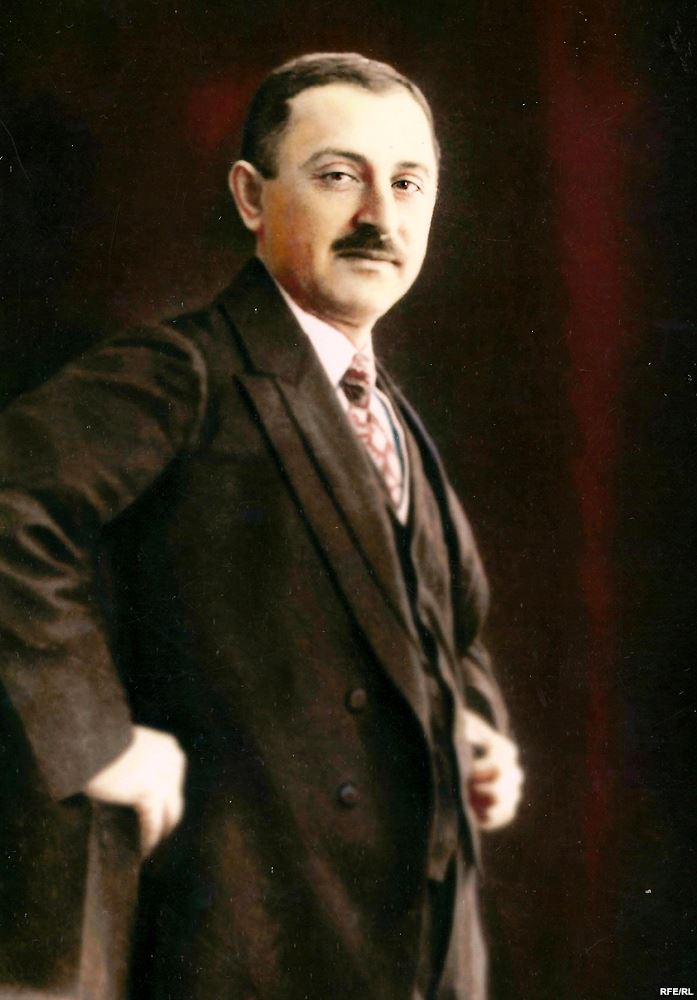 At the same time, the National Council of Azerbaijan also approved the composition of the first Temporary Government of the People's Republic of Azerbaijan headed by neutral Fatali khan Khoyski.
At the same time, the National Council of Azerbaijan also approved the composition of the first Temporary Government of the People's Republic of Azerbaijan headed by neutral Fatali khan Khoyski.
The first temporary government included the following staff:
Fatali khan Khoyski-chair of the Council of Ministers and the Minister of internal affairs
Khosrov Pasha Sultanov-Military Minister
Mamed Gasan Hadjinsky-Minister of Foreign Affairs
Nasib bey Usubbeyov-Minister of Finance and National Education
Khalil bey Khasmamedov-Minister of Justice
Mammad Yusif Jafarov - Minister of Commerce and Industry
Akper Agha Sheykhulislamov-Minister of Agriculture and Labor
Khudavat bey Melik Aslanov-Minister of Roads and Post
Jamo bey Hadjinsky-state controller
Thus, in the complicated conditions of the Great Patriotic War and the overthrow of Romanovs' absolutism the traditions of state system establishment restored in the form of the parliamentary republic on the northern lands of Azerbaijan.
The young state of Azerbaijan was established in too complicated internal and international conditions. The group of Dashnak-Bolsheviks usurped the government of Baku and initiated the genocide of the Turkic-Muslim population of the country. The groups of Armenian brigands, armed by the tsarist generals, continued the bloodshed of the Turkic-Muslim population of East Anadolu and West Azerbaijan. The despots of Azerbaijani people Shaumyan and Andronik acted conjointly. The people of Azerbaijan faced the threat of physical termination. The competition between foreign powers for control over the oil-rich Baku was nearing its end and the South Caucasus faced the next challenge -the threat of being occupated by Bolshevic Russia. The people of Azerbaijan found themselves at the crossroads whether to choose the national resurrection or to be fully removed from the ethnic political map of the South Caucasus through terminating. Under such conditions, the state officials that declared the independence of Azerbaijan led the people that were caught in the hard situation with no evident way out.
The National Council and the government moved its operation center to Ganja on June 16, 1918. Considering the real situation in the country, the National Council of Azerbaijan carried out two decisions in Ganja on June 17: to suspend its activity for a period of time; to transfer the ruling functions (both executive and legislative) to the newly established second Temporary government chaired by F.Khaoisky until the Assembly of Entrepreneurs is convened.
The government was composed of the chair of the Council of Ministers Fatali khan Khoisky, Ministers-Mamed Hasan Hadjinsky, Nasib bey Usubbeyov, Alimerdan bey Topchubashov, Behbud Agha Djavanshir, Khalil bek Khasmamedov, Khosrov Pasha bey Sultanov, Khudabat bey Rafibeyov, Khudadat bey Melik-Aslanov, Agha Ashurov, Abdul Ali bey Amirdjanov, Musa bey Rafiyev.
The National Council of Azerbaijan fearing losing the country's independence, gained with such difficulty decided to convene the Entrepreneurs Assembly as soon as possible and by that time F. Khoisky must control the government himself and make no concessions to anyone. At the same time, the National Council of Azerbaijan also defined the concrete rights and powers of the F.Khoisky government. The government wouldn't have the right to abolish the state independence of Azerbaijan and political liberties could not alter the revolutionary laws on problems of agriculture and other urgent matters. The government was free in the settlement of other matters. The temporary government had to convene the Assembly of Entrepreneurs at least within six months. Thus, the first Parliament of the Democratic Republic of Azerbaijan-the National Council started its activity. The first activity of the National Council of Azerbaijan lasting only for 20 days from May 27 till June 17 of 1918 held only 7 sessions and accepted two important resolutions: the first-Azerbaijan was declared the independent state and the Declaration of Independence was approved, the second-the first government of Azerbaijan led by F.Khoyski was formed in Ganja and Azerbaijan started to be ruled independently for the first time from 1813.
The republican state was established in one part of Azerbaijan-the North Azerbaijan.
The government of the Democratic Republic of Azerbaijan led by F.Khoisky that came to power on June 17, 1918, had to save the people of the country living intense international and inner conditions and in fact experiencing the torture of genocide from the most difficult bloody conditions of the history of the Azeri people.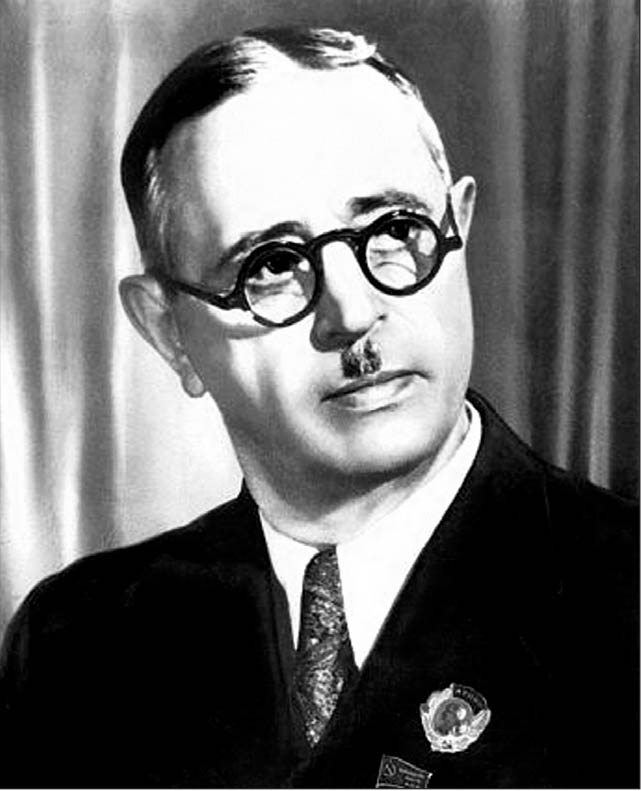
The establishment of the Azeri state system was launched immediately. The government undertook decisive actions for evasion of established situation. The military state was declared in entire Azerbaijan on June 19. The image of a white crescent and white eight-point star on a piece of red cloths has accepted the flag of independent Azerbaijan on June 24. The Military Corps of Muslims turned into the independent Corps of Azerbaijan on June 26 and the commander of the said corpse was awarded the title of a general.
The Commander of the Corpse of Azerbaijan who had powers of the division commander initiated the fulfillment of the special instructions of the government and in fact, that meant the establishment of the Azeri Army.
Azeri-Turkic language was declared the state language on June 27. The state structure even expanded at that time. The government decided upon importing textbooks and inviting teachers from Turkey. The schools were modernized and new training courses for teachers and schools were established. Yelizavetpol and Karyagin have renamed their historical names Ganja and Jabrail again. The national army of Azerbaijan was mobilized. The decision of creation of the Commission for Emergency Investigation was carried out on June 15. The commission had to inquire in the matters of violent genocide against the Turk-Muslim population of the South Caucasus and the plunder of their property during World War Second and to bring to trial those implicated. The resolution of the government, in fact, led to the creation of the system of the National Security of Azerbaijan. Moreover, the government implemented significant measures for stabilization of the situation, the establishment of transport and post-telegraph networks controlled by it. The resolution on general military service was worked out on August 11. The order on the citizenship of the Democratic Republic of Azerbaijan was issued on August 23. However, the major objective of Khoysky's government was to spread the power of the Azerbaijan Democratic Republic to all the regions of the country and to clean Baku and its suburbs from the enemies of the Azeri people.
The Islamic Army of the Caucasus supported by the group of Azeri volunteers released Baku as a result of a hard battle on September 15, 1918. The city was cleaned from the remnants of the Menshevik-dashnak government "the CentroCaspiy Dictatorship" which took control over the country following the bolshevik-dashnak regime of Shaumyan.
Within three months after the establishment of F.Khoyskiy's administration, the government of the Democratic Republic of Azerbaijan moved to Baku on September 17, 1918. Baku was declared the capital of the country. The influence of the Democratic Republic of Azerbaijan expanded.
The state flag of the Democratic Republic of Azerbaijan was replaced with the image of a white crescent and eight-point star on the three-color banner on November 9. The construction works intensified in socio-political, economic, and cultural life. F. Khoisky adhering to the legal norms and rules of the parliamentarian state system initiated preparation works for the establishment of the Entrepreneurs' Assembly. A special commission was created for the purpose: Though 6 months had not passed since the decree of June 17, 1918, of the National Council, as the government had the power to control the state independently, the National Council of Azerbaijan was created on the initiative and request of F.Khoisky on November 16, 1918. The National Council of Azerbaijan undertook the establishment of the Assembly of Entrepreneurs by the proposal of the chair of the government F.Khoisky.
An important resolution in the history of the Parliamentary structure of Azerbaijan was carried out at a session of the National Council of Azerbaijan chaired by M.A.Rasulzade on November 19, 1918. Though the government of the Democratic Republic of Azerbaijan acted in an extremely hard situation it managed to find the most democratic way of controlling the state. As not only Azerbaijanis lived in the country the session proposed the participation of other nations in the National Council of Azerbaijan as well. The council comprised 120 representatives of 1 representative from 24 thousand people. Of the 80 people were Muslims, 21 Armenians, 10 Russians, 1 German, and 1 Jew. As there was a small number of Georgians and Polishes who did not have a right to vote they were represented in the parliament only by 1 man.
According to the resolution of the session of the National Council of November 19, 1918, 44 Muslim representatives elected in the All-Russia Assembly of Entrepreneurs were directly included in the parliament, while the other 36 Muslim representatives and those of other nations had to be elected again. The new Parliament should have been formed by December 3, 1918.
Though not half of a year had passed since the genocide committed in March of 1918, 21 Armenians were able to participate in the Parliament of Azerbaijan. The step which was undertaken in such conditions proved the deep respect displayed by the human rights and the democratic nature of Azeri people.
This bright fact of our Parliamentary Democracy was revealed in the message of M.A.Rasulzade to the people on November 29, 1918, due to the establishment of the new parliament: "Let's put aside the hostility and differences that bring us only misfortune and misery. History obliged us to live side by side. Let's build our life sensibly and on the basis of humanism, let's love and respect each other to remove easily the future troubles of the new life. Despite different national and religious belonging, all the citizens of Azerbaijan are the sons of the single Motherland. They must support and help each other to coexist peacefully in the native land and to reach happiness together."
M.A.Rasulzade announced by his message that the new parliament to comprise national minorities and representatives of separate regions will rule the country and will determine its fate, form its government and protect its interests.
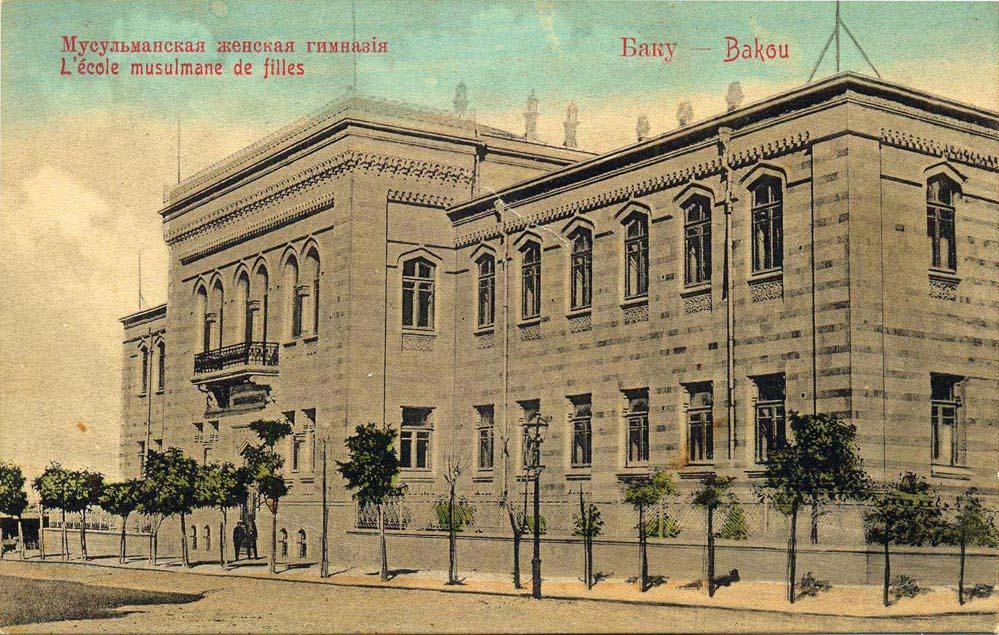 The ceremony of the opening of the Azeri Parliament was held in the building of the maiden seminary (currently, the Institute of Manuscripts after Fizuli) at 13:00 on December 7, 1918. That was the first parliament in the entire east formed on the basis of the most democratic principles of that time.
The ceremony of the opening of the Azeri Parliament was held in the building of the maiden seminary (currently, the Institute of Manuscripts after Fizuli) at 13:00 on December 7, 1918. That was the first parliament in the entire east formed on the basis of the most democratic principles of that time.
A.M.Rasulzade, the chair of the National Council of Azerbaijan delivered a wide congratulation speech at the opening ceremony of the Parliament.
By the suggestion of the Musavat fraction Alimerdan bey Topchubashev was appointed the chair of the parliament, Gasan bey Aghayev became his first deputy. As A.Topchubashev visited the peace conference in Paris, G.Aghayev headed the parliament. At the first session of the Parliament, the resignation of F.Khoisky's government was ratified and the resolution on the establishment of a new government was carried out. F. Khoyski was again instructed to form the new government.
F. Khoyski introduced his program and the composition of the new government in the Parliament on December 26, 1918. The Parliament approved the program and accepted the government established by F.Khoisky.
Though Armenians were awarded 21 and Russians 10 places in the Parliament of Azerbaijan they did not take part in the opening ceremony thus serving a lesson in the initial stage of the activity of the Azeri Parliament. The Russian National Council operating in Baku did not recognize the fact of Azerbaijan's separation from Russia as Azerbaijan established a way to the partition of the single and indivisible Russia though declaring itself independent and carried out a resolution of boycotting the Parliament of Azerbaijan.
Yet the Russian National Council was obliged to change its decision under the pressure of the country's Russian citizens.
At that period Armenians, which did not reconciliate with the independence of Azerbaijan also supported the Russian National Council and did not take part in the session of the Parliament for nearly two months. They took the position of betrayal to Azerbaijan even after getting involved in the Parliament.
Moreover, the activity of 11 fractions and groups comprising less than 100 people in the Parliament also formed an obstacle to the establishment of the independent state in extremely hard and complicated internal and international conditions. A number of fractions and groups mostly preferred their own interests rather than that of the people. Thus, the socialist bloc of the Parliament screened by protecting of interests of the poor always propagandized the annexation of Azerbaijan to Soviet Russia attained the decision on opening the diplomatic mission of Soviet Russia in Azerbaijan and finally spoke for the intervention of the Red Army into the country that was nothing but the betrayal of the Democratic Republic of Azerbaijan.
Nevertheless, the parliament of the Democratic Republic of Azerbaijan traced in the history of the state system establishment of Azerbaijan and in the parliamentary traditions with its democratic measures and high-level legislative acts and resolutions accepted in the in a period of its 17 months uninterrupted activity.
The history of the Parliamentary system was divided into two stages through the period of the Democratic Republic of Azerbaijan: the first stage lasted from May 27, 1918, till November 19. Through the said period the Parliament of Azerbaijan acting as the National Council of Azerbaijan and comprising 44 Muslim representatives carried out critical historical resolutions. The first parliament declared the independence of Azerbaijan on May 28 of 1918, undertook the reign of the government, and worked out the declaration of independence.
The declaration of independence introduced to the Caucasus governor in Tbilisi by the National Council of Azerbaijan in such complicated conditions was the most prominent legal document of the Azeri democracy and parliamentary system and retains its significance even today. 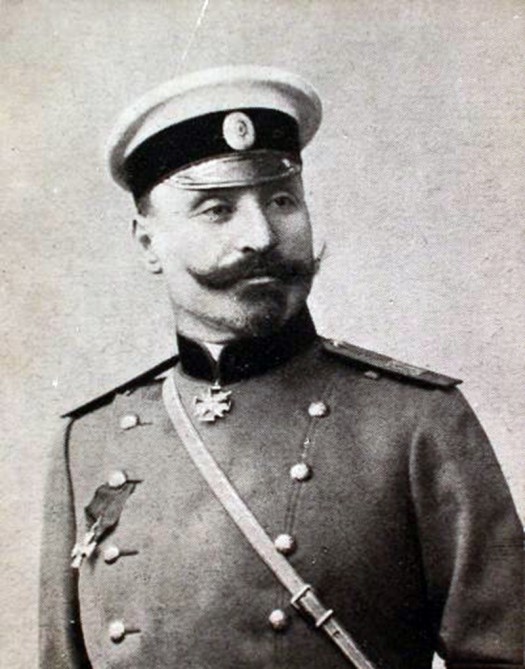
The National Council of Azerbaijan was established on May 27, its activity was suspended on June 17 and all functions of the legislative and executive powers were delivered to the Temporary government on condition of the further gathering of the Constituent Assembly at least within 6 months. After the government of the Democratic republic moved to Baku on September 17, 1918, the National Council of Azerbaijan renewed its activity on November 16. It worked out the law on the establishment of the Parliament of Azerbaijan on December 3 of the same year and suspended its activity. Thus the Parliament of Azerbaijan operated in Tbilisi, Ganja, and Baku.
The second stage in the history of the parliamentary system of the Democratic Republic of Azerbaijan lasted only 17 months from December 7, 1918, till April 27, 1920. The first session was held on December 7 of 1918, the last on April 27, 1920. The Parliament conducted only 145 sessions within this period. At these sessions the Parliament of the Democratic Republic of Azerbaijan, adhering to the main principles and considering the definite historical conditions, carried out the important laws and resolutions for the establishment of the most up-date legal and democratic state with the ensured human rights and liberties and for protection of the country's independence and territorial integrity. All these resolutions and laws aimed at the establishment of three branches of the government-legislative, executive, and judicial bodies.
The Parliament of Azerbaijan mainly directed its activity to the protection and preservation of the state independence and establishment of a single army in the hard and complicated international and inner state of the struggle of big countries for redistribution of the world in World War the first and the threat of occupation of the country. It should be noted that the Parliament members expressed unanimity of view in the discussion of laws and resolutions, worked out by the Parliament in this sphere.
Though acting in an extremely complicated situation the government of the Republic that tried to perpetuate the national resurrection of our people always attached a great deal of attention to the development of science, national education and enlightenment, and public health. Different schools, grammar schools, maiden schools, kindergartens, short-term teachers' training courses, and libraries opened in all the regions of the country, villages were provided with clinics and veterinarian centers the struggle with infectious diseases was conducted.
One of the most important laws accepted by the Parliament was on the establishment of the State University of Baku on September 1, 1919. This step was one of the most significant actions of the government for the improvement of people's welfare. Later the State University of Baku made a great contribution to the restoration of independence and perpetuation of the concepts of the Republic despite the overthrow of the Democratic Republic of Azerbaijan
The republican government and the parliament, which paid great attention to the development of science and education immediately started the training of national specialists in the said fields. At that period 100 young people of Azerbaijan were sent to study in foreign countries at the proposal of the government. The importance attached to this work is revealed in the fact that the Parliament created a special commission headed by M.E.Rasulzade and comprising five people (Mehdi bey Hadjynsky, Ahmed bey Repinov, Gara bey Garabeyov, Abdulla bey Efendiyev) to select those to be sent abroad on the competitive basis. By the resolution of the commission, 45 people were sent to France, 23 people to Italy, 10 people to England, 9 people to Turkey to study at high schools. 10 people to be sent to study in Russia could not go there due to the commencement of the civil war.
The Parliament of the Republic of Azerbaijan and the government had done much for introducing the young republic in the international arena in order to prevent the intervention of foreign countries. Due to that, the Parliament of the country carried out a resolution on the delegation led by the parliament chair A.M.Topchubashev to be sent to the peace conference in Paris on December 28, 1918. Though the prominent state official of the Republic A.M.Topchubashev removing hard obstacles attained the de-facto recognition of the republic by a number of big countries the intervention of the eleventh Red Army to the North Azerbaijan his activity remained half done.
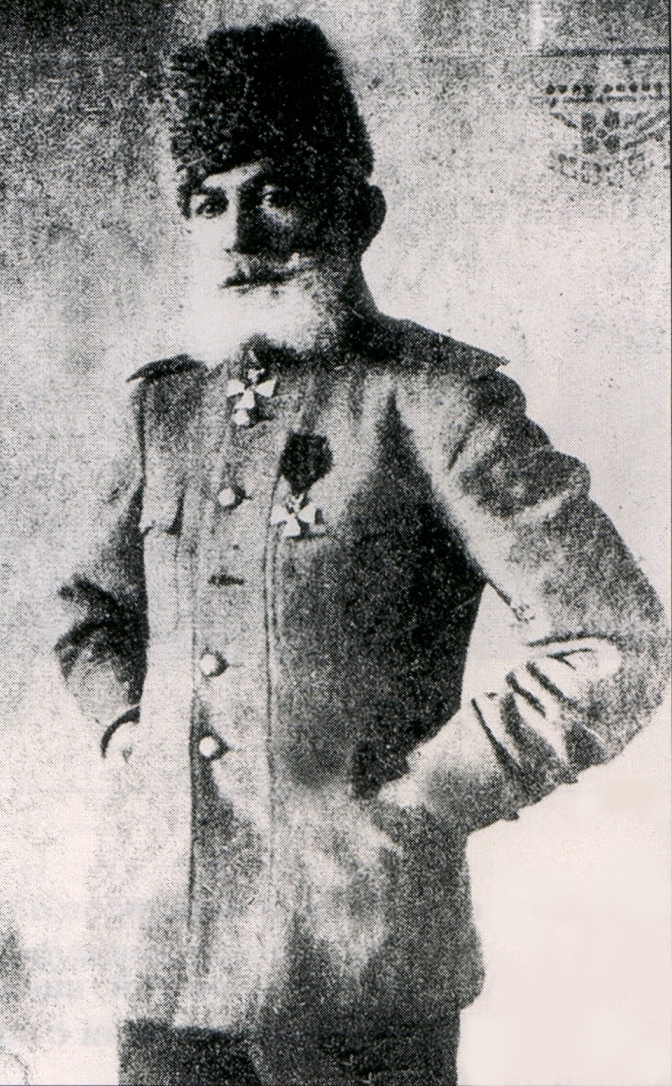 A number of contracts and agreements were signed with Iran and introduced to the Parliament in times of the Democratic Republic of Azerbaijan. The most important party of the activity of the Azeri Parliament and the government were the issues of the contacts with neighboring countries and borders. Though the relations with Georgia stabilized after a tense work, Armenia's great territorial claims made the improvement of contacts between Azerbaijan and Armenia impossible.
A number of contracts and agreements were signed with Iran and introduced to the Parliament in times of the Democratic Republic of Azerbaijan. The most important party of the activity of the Azeri Parliament and the government were the issues of the contacts with neighboring countries and borders. Though the relations with Georgia stabilized after a tense work, Armenia's great territorial claims made the improvement of contacts between Azerbaijan and Armenia impossible.
At that time the parliamentary system of Azerbaijan gradually strengthened and developed, thus forming the most up-date parliamentary system. The parliament conducted 155 sessions in a period of the Democratic Republic of Azerbaijan, ten of them were conducted in times of the National Council of Azerbaijan (May 27-November 19, 1918), and 145-in period of the Parliament's activity (December, 1918-April 27, 1920).
The parliament introduced over 270 laws for discussion with only 230 approved. The laws were discussed actively in the business atmosphere and approved only in their third reading.
The national representatives of eleven fractions and groups also participated in the development, discussion, and confirmation of the laws.
The Parliament of the Democratic Republic of Azerbaijan accounted for 11 commissions.
The activity of the parliament was controlled on the basis of the regulation of the Parliament of Azerbaijan prepared especially for the purpose.
M.E.Rasulzade gave the following assessment to the activity of the Azerbaijani Parliament:
"The National Assembly represented all the classes and nations of the country and fully controlled the fate of the state. No order came to power, no expense was made, no war was initiated and no reconciliation was signed without its participation. The government that gained the trust of the Assembly stayed while the one that failed -was overthrown. The country was not ruled by a single person. The power of the parliament was absolute".
Though ss a result of the military intervention of the Societ Russia that thus violated the international norms and the hostilities launched by the eleventh Red Army in the country North Azerbaijan was again annexed to Russia the Democratic Republic of Azerbaijan entered forever the history of our people. Though existing for only 23 months, the Democratic Republic of Azerbaijan proved that neither bloody tyranny nor the regime of suppression could not terminate the independent state system establishment and concepts of freedom of Azerbaijani people.
Though the Democratic Republic of Azerbaijan survived only for 23 months
in a complicated and tense socio-political situation, it will always stay in the
the memory of future generations as one of the brightest pages of our history.
Though it was not able to implement fully the measures undertaken in spheres
of the state system establishment, economics, culture, education, public
health, military policy yet those measures implemented played a great
role in the history of our country and in the restoration of the national state
system establishment. The most important matter is that the Democratic
The Republic of Azerbaijan strengthened our democratic views though it existed
within a short period of time. The people of Azerbaijan will always honour the memory
of the prominent state officials that served to the establishment of that republic
as Mamed Emin Rasulzade, Alimerdan bey Topchubashev, Fatali khan Khoyski,
Nasib bey Usubbeyov, Mehdi bey Hadjinsky, Mamed Yusif Djafarov,
Khudavat bey Rafibeyov, Akper Agha Sheykhulislamov, Teymur bey Madjinsky,
Samed bey Mehmandarov, Aliagha Shykhlinsky, Sultan Medjid Ganizade, Khalil bey
Khasmamedov, Ahmed bey Papinov, Shafi bey Rustambeyov.
Heydar Aliyev
The first Parliamentary Republic of the Azerbaijani people at the same time was the first legal and secular state of the entire East and especially of the Turkic-Muslim world.
The Democratic Republic of Azerbaijan did not lay behind the traditional democratic republics of Europe by its state system, democratic state establishment measures as well as the objectives and tasks it undertook.



